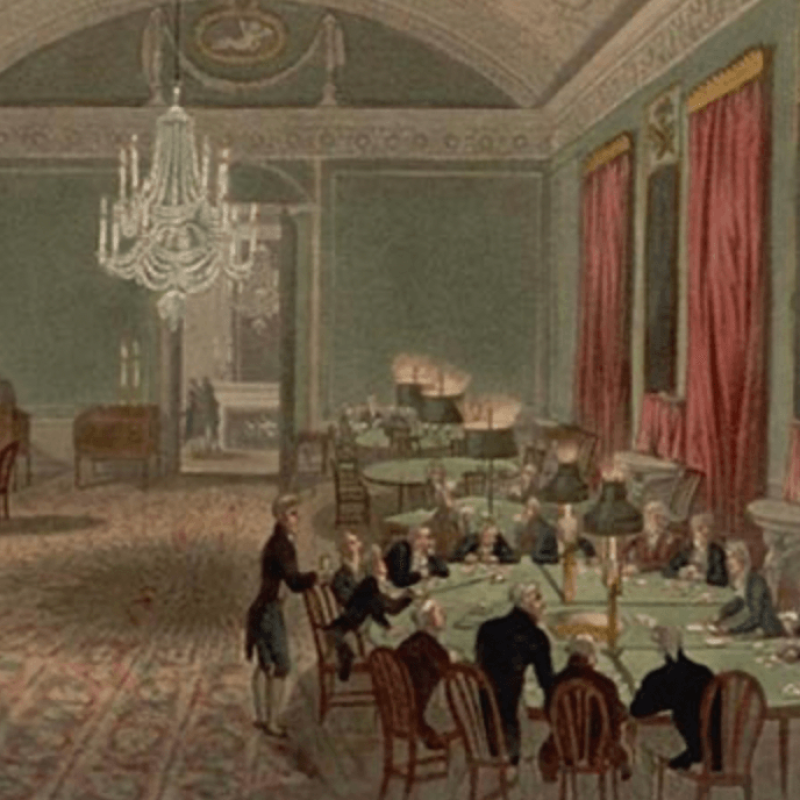The King of Clubs
By: Laura Boyle (JaneAusten. co. uk)

THE KING OF CLUBS
"I expect my surveyor from Brockham with his report in the morning; and afterwards I cannot in decency fail attending the club." - General Tilney, Northanger Abbey

Every respectable Regency gentleman (and a few who were not exactly so respectable) belonged to a gentleman's club. Some of the most popular in London were White's, Brooks's and Boodle's. All were very exclusive, with Boodle's ranks including William Wilberforce, David Hume and Adam Smith to name but a few. When a member was accepted into a club, it was known as an "election". If a gentlemen had been a member for say 3 years, others would use phrases such as "three years after his election into so and so" when referring to the individual. Exclusive gentleman's clubs often used a method of voting for or against new members by anonymously placing black and white balls into a special box. A single black ball was sufficient to deny this individual membership to the club, hence the term "blackballed".
By far the most revered and oldest of London's gentlemen's clubs, popular during the Regency era, was White's. It was founded as a chocolate shop in 1693 by an Italian, Francesco Bianco, who had changed his name to Francis White. White's was politically conservative and is still considered today to be one of the most prestigious gentleman's clubs in the world. Originally, the club had mostly been a gambling hub, with members who frequently played high stakes card games such as whist, faro, quinze and hazard.

Brooks's Club, Gaming Room
Brooks's, in comparison to White's, was a liberal gentleman's club. Whig membership was high and included nobles such as the Duke of Portland, the Duke of Roxburghe, Lord Crewe and Lord Strathmore. As a gaming club established in 1764, Brooks's was located in Pall Mall and like White's, was characterised by high stakes card games. It had been customary for gamblers to play for anything between fifty to ten thousand pounds! Charles Fox and his brothers had been known to lose many thousands of pounds in a single night at Brooks's, and hazard was their customary game of choice.

Boodle's, Exterior.
Last but not least, there have been many varying descriptions of Boodle's that have circulated. It is hard to be conclusive, but it seems to have offered a wider range of gaming than the gentleman's clubs mentioned above. Some sources say Boodle's was the club for country squires and those who rode to hounds in fox hunts. It was not tied to any political party, at least not during the Regency era.

The Athenium, Lobby.
It is thought that The Athenium Club, founded a little after the Regency era in 1824, focused on Ancient Rome and Greece. They supposedly used only Latin to speak to one another, not a problem for the wealthy gentleman who would have been instructed in the language during his years of education.
The Four Horse Club, also called the Four In Hand Club, had originally been a club of wild young men. However, by the early 1800s, it become a much more respectable club for superb drivers. It was a small group with only somewhere between 30 to 40 members at its peak. They did not have a specific meeting place and began to fade out from the gentleman's scene around 1815, disbanding in 1820 and formally ending by 1822. The members reportedly met at set intervals to drive coaches out to Chalk Hill and back.
The Code of Conduct and Terms of Service must be complied with.
Anything posted about current politics or religion not relevant to Jane Austen and/or the topics referred to in the group description above will be deleted as "off topic".
Videos or images or links to sources that the Administration cannot open must be described or explained when requested or they will be deleted.






These kinds of clubs still exist, although many differ. For example, belonging to a fraternity is belonging to a club, or belonging to a Golf Club. However, they were popular among "gentlemen" during the Regency period during which Jane Austen wrote her novels.
These kinds of clubs still exist, although many differ. For example, belonging to a fraternity is belonging to a club, or belonging to a Golf Club. However, they were popular among "gentlemen" during the Regency period during which Jane Austen wrote her novels.
There are many different types of clubs in different countries. Many of them have an air of exclusivity-- members usually being wealthy. And often snobs.
I think they were always especially popular in Britain, because for many years there was a very rigid class system.
My closest friend for years married a wealthy man (second marriage, she married him later in life) and they moved to Florida. They have a really nice place on a Golf club, and of course they're members of the club. She had never played Golf before but now she plays regularly.
Interestingly its a short drive from Mar a Lago. (She once played at the course-- or perhaps it was another one close by.) Anyway she got a caddy who caddies for Trump and told her some interesting things about him!
When my father was retiring and sold his business he purchased a golf club condominium at the Hollybrook Golf and Country Club which is in Hallandale west of Hollywood, Florida. He had sent my mother down to pick it out, and unfortunately he died of a heart attack without ever seeing it or playing golf there, a game he had learned late in life to enjoy. When my mother died my brother and I inherited the condo so I, too, was an owner of a golf club condo in Florida, and we did make use of it.
My friend's condo is in Bocs Raton.
I'm not all that familar with Florida. Is Holloywood FL near Miami?
Not that far. Hollywood is north of Miami and Boca Raton is north of that.
I said that where my condo was was Hallandale, but I just realized that it was in the municipality of Pembroke Pines.
There are also "secret societies" (which are somewhat different than the types of clubs mentioned here). A friend of mine was a member of the Freemasons. He suggested I join. I researched it out and decided not to join.
Because of my ongoing interest in various types of mysticism*, I had looked at a few of these mystical groups. The real Rosicrucians go back a long way. I almost joined but they teach a lot of ancient mystical beliefs most of which I alrready know. And speaking of mysticism, I went to an introductory session of a Kabbalistic society. Again, I chose not to follow that path.
Some secret societies are for the rich and powerful:
1. The Illuminati: Once powerful, apparently they were wiped out long ago. (But conspiracy theorists love to talk about them and believe they are a really dangerous group that still exists.
2. The Knights Templar: Once powerful. If they still exist they are probably more like a small number of adults playing dress-up (well, I could be wrong)
3. Skull and Bones. Started at Yale. Several presidents were members. There are conspiracy theories that they have sinister motives, but I doubt it.
There are others....
The Freemasons of today are pretty benevolent, and also they do some good work for charity. Probably the main reason to join would be to meet a lot of successful people of good character in your area
_________________________________________________________________________________
*"Mysticism": I've studied various forms for years. For example, I've being doing Tarot readings for over 40 years-- also Astrology as well during that time. Plus-- other "mystic" stuff...
When one watches the movie The DaVinci Code one learns of such societies such as the Knights Templar and the Priori.
Yeah, that was another good one. I hope they make more Robert Langdon movies.
I never actually saw the movie but I did read it in book form. I really liked liked it.
At the time I was thinking it might be fun to be in a secret society...
Oh-- I forgot to mention-- these are "real" clubs. Never joined but I met a woman who was a member of the harvard Club and she invited me to dinner there. (She was a stock broker-- it was a sales pitch).
Also long ago I had a friend who was a famous stock market-timer guy at the time-- once when he spoke at the Yale Club I was invited to attend a lecture of his there.
These are also "real" clubs:
These are also "real" clubs:
Makes me wonder whether I'd ever join a club that would allow a person like me to become a member.”
Didn't Groucho say something like that?